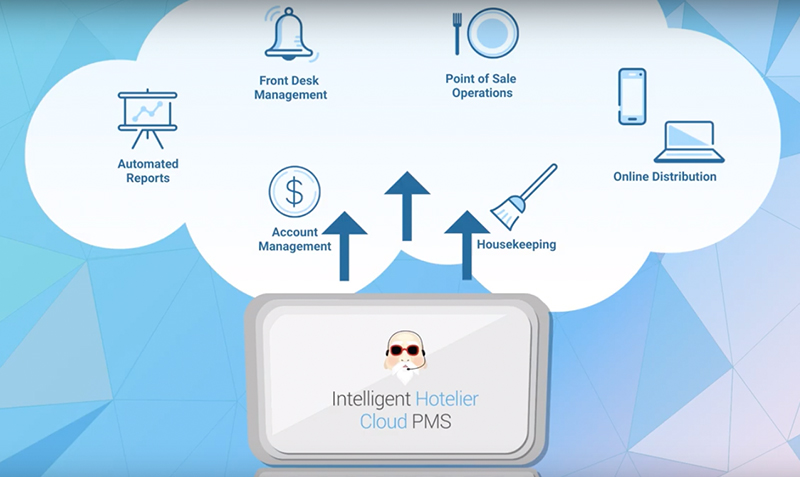
The hotel front desk is often thought of as the focal point of hotel operations.
It’s a front-line position for staff meeting new guest and the last place to farewell guests. But more than just a meet a greet service - the front desk is also the repository of hotel information such as room inventory, rates and financial reporting. Its also the connectivity hub to different departmental functions including: room service, housekeeping, and accounting.
In order to make sure information and guest interactions take place seamlessly, hotels have come to rely on the Property Management System – fondly referred to as the PMS.
Yet different hotels have different expectations of a PMS.
In the past 10 years and evolution of personal computing and mobile phones have changed the way travelers of the new age plan and purchase their travel experiences.
Particularly because of the introduction of new technology, like smart phones, declining cost of mobile data and the prevalence of WiFi connectivity, the changes have given rise to on-line travel agencies and the way consumer book - moving away from traditional methods and into on-line systems and mobile devices.
Hotels themselves were slow to adapt, opting instead to stick with more traditional and well-established systems. However, this is now starting to change.
Current trends show that hoteliers are finally embracing the use of cloud technology. Cloud-based solutions are steadily becoming more and more popular, due to established companies in the industry migrating their software to the cloud and a myriad of new start-ups offering cloud-native solutions.
In recognition of the new playing field, many traditional PMS vendors have already launched cloud versions of their software, offering them in addition to the on-premise solutions and many new PMS cloud solutions are being realized.
We all know how the Property Management System can empower hoteliers to improve their operations, increase sales and streamline the interaction with guest. But what are the specific benefits of cloud-based PMS that you don’t get from the traditional on-premise solutions that most hotels continue to use?.
Let’s have a look at a few of the advantages...
The most obvious advantage is that the PMS is accessible from any computer, regardless of the operating system being used and from any relatively modern mobile device, such as smartphones and tablets, with an acceptable screen size. The hotelier can, for example, check for arrivals/departures, whether he is at his office, at home, in a meeting or any other location. This benefits the hotel staff too, as they are no longer tied to a specific terminal or the front desk and can offer their services on the go.
Cloud-based PMS are usually easier to integrate with third-party solutions, such as central reservation systems, revenue or yield management systems, POS and channel managers, compared to on premise systems, through the use of APIs designed specifically for that purpose. Older systems were much more proprietary.
Cloud technology is scalable by design. As a hotel’s or hotel-chain’s size and operations grow, the cloud vendor is able to scale the processing power and data storage needs to match the demand. This obviously comes at an additionally service cost from the vendor, but that is far lee costly than having to upgrade a business’ own infrastructure.
Even though cloud-based PMS offer great advantages and are now considered an established product, there are still some areas of concern.
Cloud PMS solutions typically allow you to similar to legacy based system for a fraction of the cost. The benefit of cloud based software, is that software updates happen on the vendor’s server and therefore, everyone is always using the latest version. This prevents compatibility issues between terminals using different versions of the software and saves time for I.T. personnel spent on upgrading different machines.
Server failures and malfunctions have the potential to be disastrous, when dealing with traditional on premise solutions, especially on the enterprise level. They can lead to data loss, data corruption and extended downtimes. By choosing a reputable cloud vendor, the customer no longer has to worry about such issues.
Cloud-based software has very little requirements in terms of processing power and storage. Any old computer that can access the internet, or a mobile device, can be used to operate a cloud-based PMS; which leads us to the next point
Cloud based software typically trades the upfront cost of on premise solutions for a subscription-based pricing model. It also eliminates the need for specialized hardware purchases (servers) and saves up on I.T. personnel cost.
And finally - once your PMS is connected to a Channel Manager, all your booking details from the various booking channels (i.e. your website, Booking.com, Airbnb, Hostelworld, etc.) arrives automatically to your PMS. This allows your guests to check availability and book your rooms on-line quickly and easily and minimizes the number of incoming phone calls from guests and Travel Agencies checking availability.
The Hoteliers.Guru Intelligent Cloud Property Management System offers many of the benefits mentioned in this blog and for the fraction of the cost of traditional Legacy systems – either as a standalone package, or as a two or three in one solution. Try it free for one month – No Obligations !